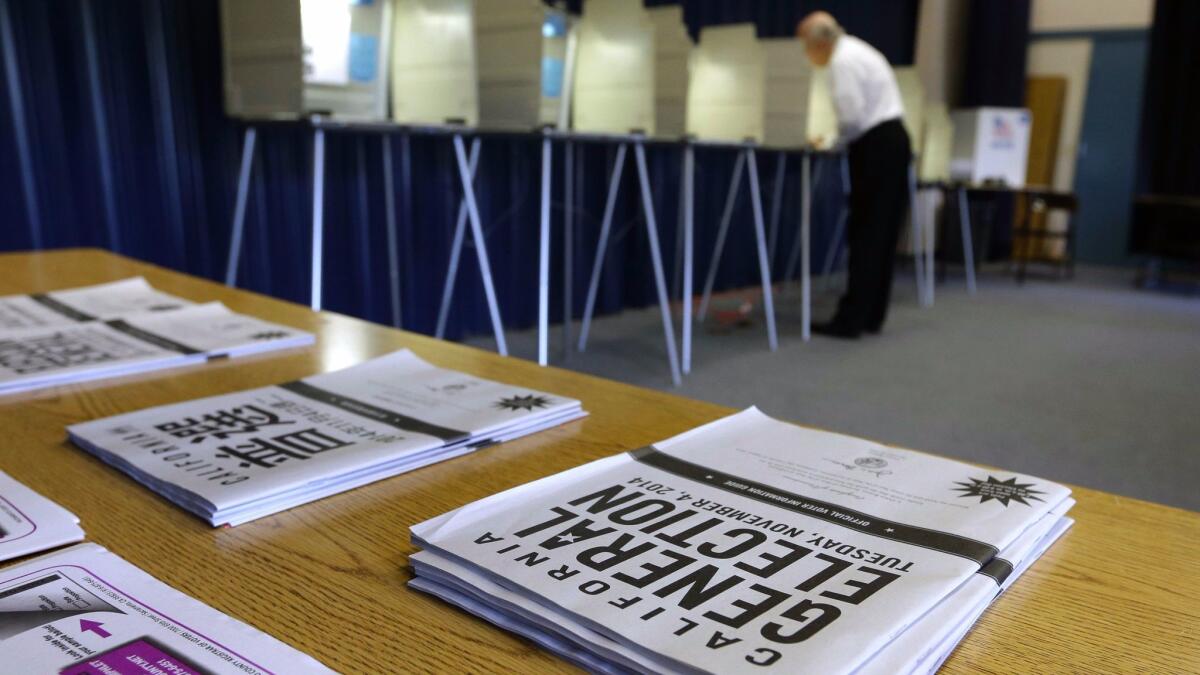They sued for Clinton’s emails. Now they want information on California voters

- Share via
Reporting from Sacramento — California’s top elections officer and 11 county registrars have been asked to hand over detailed voter registration records or face a federal lawsuit, a request that centers on new accusations that the records are inaccurate.
The effort by the conservative-leaning organization Judicial Watch seeks an explanation for what its attorneys contend are official records that don’t match the group’s estimates of the legally eligible voting population in the counties, including Los Angeles County.
“We want the actual data,” said Robert Popper, an attorney for the Washington, D.C.-based organization.
The effort was sharply criticized Tuesday by California Secretary of State Alex Padilla, who said he has yet to make a final decision on how to respond.
“It’s bad math and dubious methodology,” Padilla said of the accusations.
Judicial Watch has recently attracted attention for its aggressive effort to gather emails from Hillary Clinton’s time as U.S. secretary of State, as well as documents related to the 2012 attack on the American embassy in Benghazi, Libya.
The latest effort seeks information about two separate lists of registered voters. Like other states, California elections officials maintain both an “active” and “inactive” list of voters. In a letter sent to Padilla last week, the group charged California officials don’t have “an accurate record of eligible voters.”
The exact size of the alleged errors is unclear. Judicial Watch declined a request from the Los Angeles Times to provide the full details of its voter registration analysis.
“We may be in litigation shortly,” Popper said when asked why the information won’t be shared.
Those details, however, are at the heart of the complaint. Judicial Watch alleges that adding together the active and inactive voter lists in the 11 counties produces a total number of voters significantly larger than the estimate of voting-age citizens calculated by the U.S. Census Bureau’s American Community Survey. The organization used the ACS five-year average for its baseline of eligible voters.
The letter to Padilla claims that combined registration in the counties — Imperial, Lassen, Los Angeles, Monterey, San Diego, San Francisco, San Mateo, Santa Cruz, Solano, Stanislaus and Yolo — exceeds 100% of the eligible voting population. Popper said his group believes it’s important to include both active and inactive voters in the tally — because inactive voters can show up and cast ballots.
“There are a lot of different ways that a system can be abused,” he said. “When you get a really big inactive list, like they have in California, it’s a sign that things aren’t going well.”
Dean Logan, the registrar of voters for Los Angeles County, countered that the two lists are quite different. He said the inactive voter list is more like “a fail-safe to make sure that people are not administratively disenfranchised.”
Even then, elections officials argue the lists shouldn’t be compared with ACS data, which are compiled with caveats about population accuracy.
“Voter registration is not a survey,” Gail Pellerin, registrar of voters in Santa Cruz County, said in questioning Judicial Watch’s methodology. “We deal in real facts.”
Pellerin said Santa Cruz County has 44,172 names on its inactive list, and only 12 of them came forward to cast ballots last November. A voter on an inactive file who moves to a new residence must cast a provisional ballot — which isn’t counted until elections officials confirm the person’s eligibility. In her county, Pellerin requires voters who are on the inactive list due to not voting to recite their entire address and sign new registration forms under penalty of perjury.
“We want our voter file to be as accurate as possible,” she said.
Political Road Map: California’s big change in elections is off to a rocky start for 2018 »
Rules governing the list of inactive voters in each of California’s 58 counties are dictated by both state and federal election law. Elections officials aren’t easily able to discard the registration of voters who stop casting ballots. Last year, a long-awaited statewide voter registration database went online that allows counties to quickly maintain records that can track the movement or death of voters.
The Judicial Watch allegations come on the heels of intense debate over President Trump’s unproven claims of massive 2016 voter fraud in California and other states. Those comments led to the creation of a presidential commission on voter fraud, whose leaders have asked for similar details — names, addresses and birth dates — regarding California voters as the new legal complaint.
Padilla, who has twice refused to give the information to the presidential panel, said he doesn’t believe the new allegations are a coincidence.
“To me, it’s clearly part of a concerted effort, a continued attack on voting rights and setting the stage for the Trump administration to roll back voting rights,” he said.
Judicial Watch’s letter warned a federal lawsuit is possible if active and inactive voter data aren’t turned over next week. Padilla said he hasn’t yet decided how, or when, to respond to the request.
Follow @johnmyers on Twitter, sign up for our daily Essential Politics newsletter and listen to the weekly California Politics Podcast.
ALSO:
Trump’s voter fraud panel again asks for California data — and again, the answer is no
More Californians will vote by mail, and not at polling places, under a new law
Updates on California politics
UPDATES:
4:15 p.m.: This article was updated with an additional quote from Robert Popper.
This article was originally published at 3:45 p.m.
More to Read
Get the L.A. Times Politics newsletter
Deeply reported insights into legislation, politics and policy from Sacramento, Washington and beyond. In your inbox three times per week.
You may occasionally receive promotional content from the Los Angeles Times.











